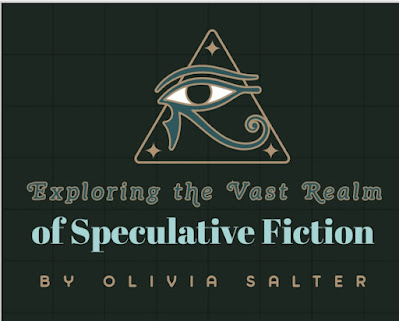Exploring the Vast Realm of Speculative Fiction
by Olivia Salter
Speculative fiction is a captivating genre that transports readers to imaginative worlds, challenging the boundaries of our reality and exploring endless possibilities. It encompasses a wide range of narratives that blend elements of science fiction, fantasy, horror, and the supernatural. Through its imaginative settings, speculative fiction offers thought-provoking social commentary, explores philosophical questions, and sparks our imagination like no other genre.
Science Fiction:
Science fiction within speculative fiction is deeply rooted in scientific principles and technologies that are beyond our current capabilities. Whether it be interstellar travel, advanced artificial intelligence, or time manipulation, sci-fi pushes the boundaries of what we perceive as possible. Authors like Isaac Asimov, Arthur C. Clarke, Philip K. Dick, and Octavia Butler have gifted us with iconic works that not only entertain but also challenge our understanding of the universe and humanity's place within it.
Fantasy:
Fantasy, another major component of speculative fiction, invites us into magical worlds filled with heroes, mythical creatures, and epic quests. Well-known authors such as J.R.R. Tolkien, George R.R. Martin, Ursula K. Le Guin, and Neil Gaiman have crafted sprawling tales that transport readers to realms of endless wonder and enchantment. From the classic epics like "The Lord of the Rings" to the gritty and morally ambiguous worlds of "A Song of Ice and Fire," fantasy captivates us with its rich world-building and intricate storytelling.
Horror and the Supernatural:
Speculative fiction also delves into the darkness of horror and the supernatural, enticing readers with tales that thrill and terrify. These stories often explore the depths of human fears of the unknown and the paranormal. From the chilling works of H.P. Lovecraft and Stephen King to contemporary authors like Shirley Jackson and Clive Barker, this aspect of speculative fiction offers a gripping and unnerving experience that lingers long after the pages have been turned.
Social Commentary and Reflection:
Beyond its imaginative settings, speculative fiction serves as a powerful tool for social commentary and introspection. It allows authors to tackle complex social issues, explore alternative historical narratives, and challenge societal norms in a way that is both creative and thought-provoking. From Margaret Atwood's dystopian masterpiece "The Handmaid's Tale" to Aldous Huxley's cautionary vision of the future in "Brave New World," speculative fiction forces us to reflect and consider the implications of our present actions.
Inspiring the imagination:
Speculative fiction has a unique ability to awaken the imagination within readers. By presenting narratives that push the boundaries of reality, it encourages us to question our assumptions, challenge the status quo, and consider new possibilities. This genre thrives on creativity, giving authors the freedom to explore limitless worlds and concepts, which in turn sparks the creativity of their readers.
In conclusion, speculative fiction is an extraordinary genre that expands the boundaries of storytelling and takes us on exhilarating journeys beyond our imagination. Through its blend of science fiction, fantasy, horror, and the supernatural, it offers us a limitless realm of exploration, intellectual stimulation, and emotional engagement. Whether it is the futuristic worlds of science fiction, the mythical realms of fantasy, or the chilling horrors of supernatural speculative fiction, they continue to captivate readers and inspire new generations of storytellers to push the boundaries of what is possible.


No comments:
Post a Comment